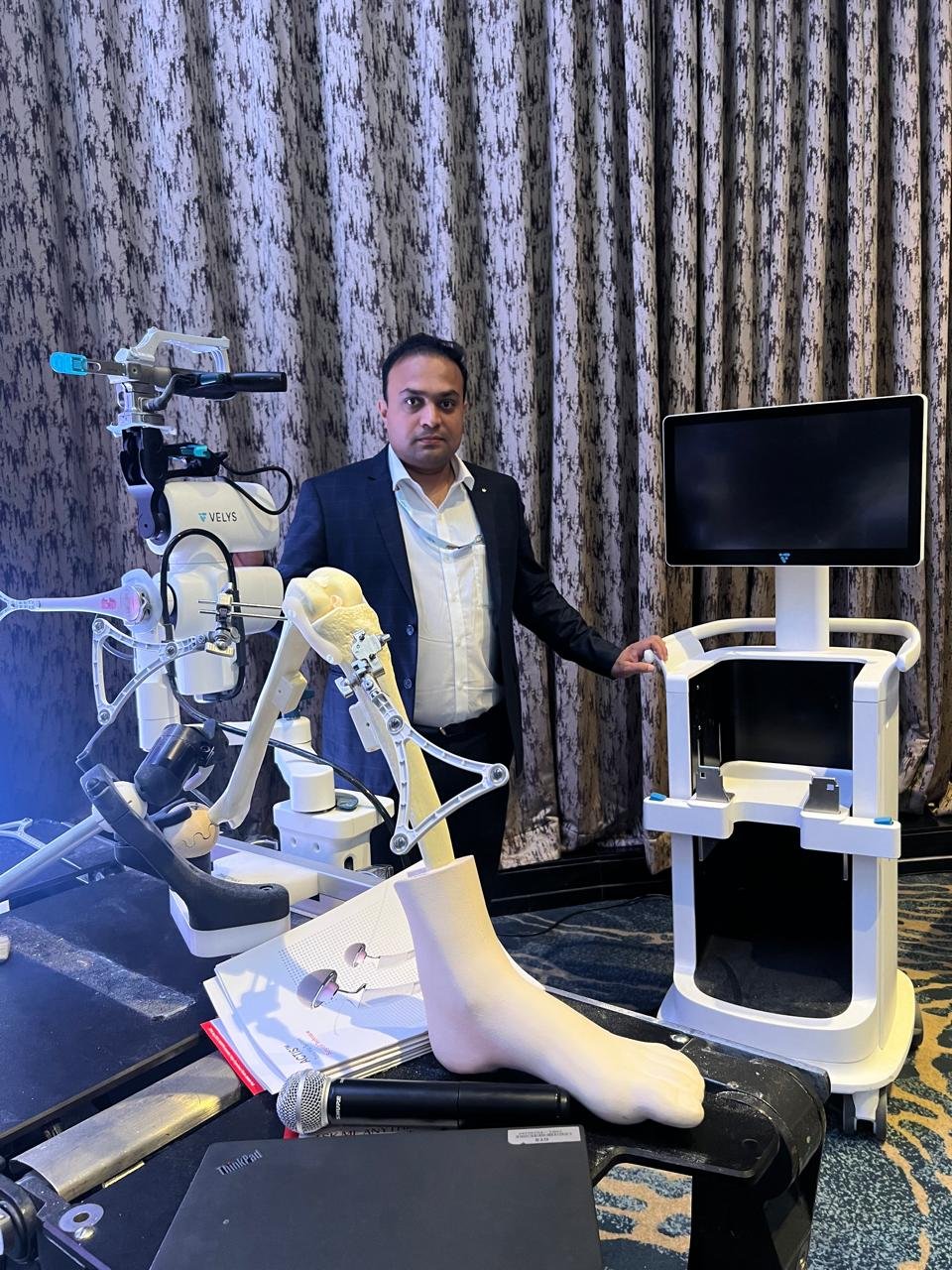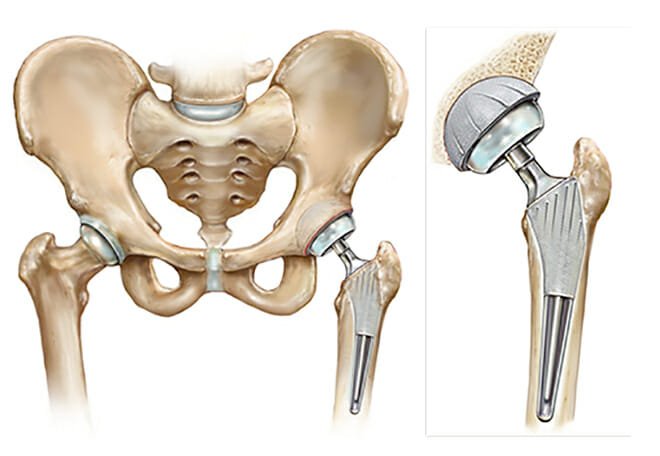Meet Our Doctor

Dr. Prajaktam M. Lende
ORTHOPAEDIC & JOINT REPLACEMENT SURGEON
Fellowships
- Navigation Based Joint Replacement Surgery (Hip & Knee Arthroplasty)
- Arthroscopy & Sport Medicine
- Ilizarove Surgery
- Observer Ship in Pediatric Orthopaedic Surgery (Wadia Hospital, Mumbai)
Hip Replacement In Nagpur
Home / Hip Replacement In Nagpur

Hip Replacement In Nagpur
Whether you have got got merely begun exploring treatment selections or have already determined to endure hip replacement surgery, this information will assist you understand the real meaning of total hip replacement.
If your hip has been broken by disease, a fracture, or various conditions, common activities like walking or getting into and out of a chair is additionally painful and difficult. Your hip is additionally stiff, and it’s getting to be arduous to put on your shoes and socks. you’ll even feel uncomfortable whereas resting.
If medications, changes in your everyday activities, and so the employment of walking supports don’t adequately facilitate your symptoms, you’ll take under consideration hip replacement surgery. Hip replacement surgery is also a secure and effective procedure that will relieve your pain, increase motion, and assist you come to to enjoying ancient, everyday activities.
Hip Anatomy
The hip is one in every of the body’s largest joints. it’s a ball-and-socket joint. The socket is created by the socket, that’s a part of the pelvis bone. The ball is that the os longum head, that’s that the upper end of the thighbone (thighbone).
The bone surfaces of the ball and socket unit of measurement lined with piece cartilage, a sleek tissue that cushions the ends of the bones and permits them to maneuver merely.
A thin tissue stated because the animal tissue surrounds the ball-and-socket joint. in associate degree extremely healthy hip, this membrane makes atiny low amount of fluid that lubricates the cartilage and eliminates the bulk friction throughout hip movement.
Bands of tissue stated as ligaments (the hip capsule) connect the ball to the socket and provide stability to the joint.
Types of hip replacement ?
There are 3 major types of hip replacement :
- Total hip replacement (most common)
- Partial hip replacement
- Hip resurfacing
The most common form of hip replacement surgery {is known as|is named|is termed} a complete hip replacement (also called total hip arthroplasty). during this surgery, worn-out or broken sections of your hip area unit replaced with artificial implants. The socket is replaced with a sturdy plastic cup, which can or might not conjointly embrace a metallic element metal shell. Your limb head are removed and replaced with a ball made up of ceramic or a metal alloy. The new ball is connected to a metal stem that’s inserted into the highest of your thighbone.
Common Causes of Hip Pain
The most common reason behind chronic hip pain and incapacity is disease. osteoarthritis, autoimmune disease, and traumatic inflammatory unit of measurement the foremost common forms of this illness.
Osteoarthritis. this could be age-related wear and tear kind of disease. it perpetually happens in of us fifty years senior and older and sometimes in folks with a chronicle of disease. The cartilage artifact the bones of the hip wears away. The bones then rub against each other, inflicting hip pain and stiffness. osteoarthritis might in addition be caused or accelerated by delicate irregularities in but the hip developed in childhood.
Rheumatoid disease. this could be Associate in Nursing illness throughout that the animal tissue becomes inflamed and thickened. This chronic inflammation can hurt the cartilage, leading to pain and stiffness. atrophic {arthritis|rheumatism|arthritis|autoimmune disease|autoimmune disorder} is that the foremost typical kind of a gaggle of disorders termed inflammatory arthritis.
Posttraumatic disease. this could follow a major hip injury or fracture. The cartilage may become broken and lead to hip pain and stiffness over time.
Osteonecrosis. Associate in Nursing injury to the hip, sort of a dislocation or fracture, may limit the blood provide to the os longum head. this could be stated as osteonecrosis (also typically remarked as avascular necrosis). the dearth of blood may cause the surface of the bone to collapse, and disease may result. Some diseases might cause osteonecrosis.
Childhood hip unwellness. Some infants and children have hip problems. though the problems unit of measurement successfully treated throughout childhood, they’re going to still cause disease later in life. This happens as a results of the hip may not grow usually, and so the joint surfaces unit of measurement affected.
When Hip Replacement is needed?
There unit of measurement several reasons why your doctor may advocate hip replacement surgery. those that have the good thing about hip replacement surgery generally have:
Hip pain that limits everyday activities, like walking or bending
Hip pain that continues whereas resting, either day or night
Stiffness in associate degree extremely hip that limits the pliability to maneuver or elevate the leg
Inadequate pain relief from anti-inflammatory medication, therapy, or walking support.
Why Is Hip Replacement Surgery Needed?
Hip replacement surgery is the usually needed to repair or damage to the hip joint include :
- Osteoarthritis.
- Rheumatoid arthritis.
- Osteonecrosis.
- Injuries or fractures from trauma or disease.
Your healthcare provider may recommend that you try other treatments before having hip replacement surgery, including:
- Pain medications.
- Physical therapy and exercise programs.
- Activity changes to limit strain on your hip.
- Assistive devices such as a cane, crutch, or walker.
If after trying other therapies you are still having joint pain that limits your activities, your doctor may recommend hip replacement surgery. New technologies have improved artificial parts so that they handle more stress and last longer. This means that hip replacement surgery can also be successful in people of all ages.
However, it is important to be aware that hip replacement surgery may not be recommended for people with certain health conditions. You and your doctor will determine the best treatment for you depending on your health history and the risks associated with the surgery.
Infection
To reduce the risk of infection, special operating theatres are often used, which have clean air pumped through them. And most people will be given a short course of antibiotics at the time of the operation.
Despite these precautions, a deep infection can occur in about 1 in 100 cases. The infection can be treated but the new hip joint usually has to be removed until the infection clears up. A new hip replacement will then be given six to 12 weeks later.
Loosening
The most common reason for a hip replacement to fail is when the artificial hip loosens. This usually causes pain, and your hip may become unstable.
Loosening is most common after 10–15 years, although it could happen earlier. It’s usually linked to thinning of the bone around the implant, which makes the bone more likely to fracture.
A fracture around the implant usually needs to be fixed surgically and the implant may need to be replaced.
Preparing for Hip Replacement Surgery
Preparing for hip replacement surgery begins several weeks or more before the actual surgery. Being as healthy as possible before your surgery can help you recover and lower your chances of developing a complication.
You can do several things before hip replacement surgery to help you prepare for surgery and recovery.
- Speak with your surgeon and other health care team members about what to expect. Request written information or learn more about the procedure by visiting one of the websites listed in our Related Resources section.
- Ask your surgeon about exercises you can perform to strengthen your core, upper body, and leg muscles before surgery.
- If you smoke, try to quit or cut back on the amount you smoke.
- If you are overweight, try to lose weight. Being overweight can increase the risk of complications during or after surgery.
- Arrange for transportation for your procedure and follow-up visits with the surgeon.
Best AVN treatment In Nagpur
Dr. Prajaktam Lende is a trusted Orthopedic doctor In Nagpur. Top joint Replacement surgery Doctor in Nagpur. Book an Appointment with Dr Prajaktam M. Lende, one of the prominent orthopaedic surgeon specialised in Joint Replacement surgery and ligament Reconstruction surgery Dr Prajaktam M. Lende at Nagpur. He is currently associated with the Orthopedic & Joint …
